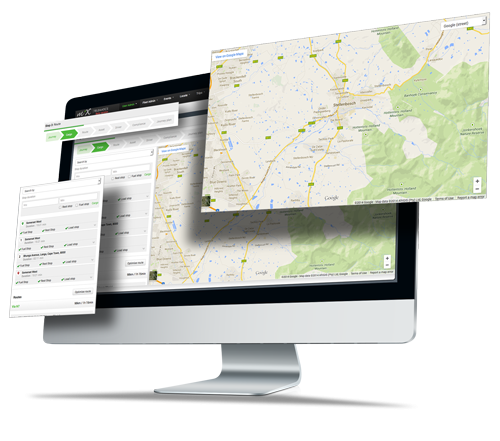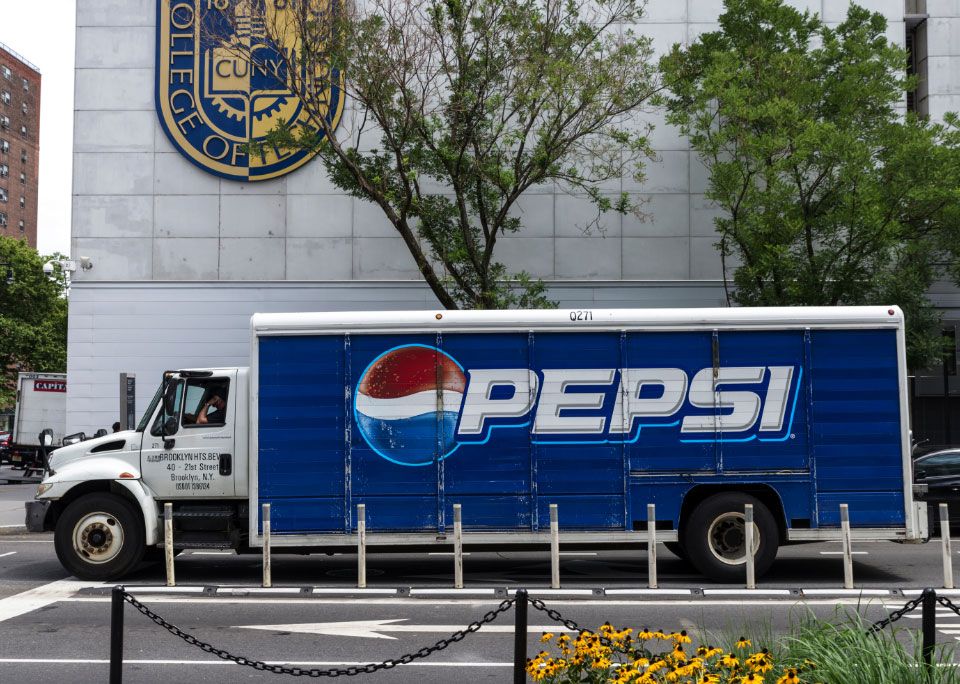Fast-moving consumer goods (FMCGs) refer to low cost products that sell quickly. They are also often called consumer packaged goods.
Because FMCGs are perishable or in high consumer demand (or both), they have a short shelf life. They are frequently priced low, purchased quickly, consumed rapidly, and generally sold in huge quantities. To understand FMCGs and the challenges facing FMCG fleet management, let's take a look at the all-important fast-moving consumer goods industry and supply chain.
Understanding Fast-Moving Consumer Goods (FMCG)
Simply stated, consumer goods are products sold and purchased for easy consumption by consumers. So, what are FMCG products, and how are they different?
Consumer goods are divided into three categories: durable goods, nondurable goods, and services. Durable goods have a shelf life of three years or more, and nondurable goods have a much shorter shelf life of less than a year. Since FMCGs have a short shelf life and are generally consumed almost immediately, they are considered non-durable goods. They are also the most significant consumer goods segment, accounting for more than half of total consumer spending.
It's hard to think of anyone who doesn't use FMCGs almost every day. They are the purchases made at the grocery store, convenience store, supermarket, produce stand, and warehouse outlet. Gum, fruit, vegetables, dairy, paper goods, beer, and soda, as well as aspirin and other drugs sold over the counter, all fall into the FMCG category.
Within the broad category of FMCGs are several smaller categories such as:
- Processed foods: Cereals, boxed pasta, and cheese products
- Prepared meals: Meals that are ready-to-eat
- Beverages: Energy drinks, soda, juices, and bottled water
- Baked goods: Snack cakes, cookies, bagels, and croissants
- Fresh foods, frozen foods, and dry goods: Fresh fruits and vegetables, frozen vegetables, nuts, and raisins
- Medicines: Aspirin, Ibuprofen, acetaminophen, and other non-prescription or over-the-counter medication
- Cleaning products: Baking soda, counter cleaner, and oven cleaner as well as glass and window cleaner
- Toiletries and cosmetics: Shampoo, conditioner, concealers, soap, and toothpaste
- Office supplies: Pencils, pens, and markers
Unique Challenges Faced by FMCG Fleets
Because FMCGs are in such high demand, have such high turnover, and have such a short shelf-life, the market is extremely huge and highly competitive. Some of the largest and most well-known companies in the world compete for the FMCG market share, such as Coca-Cola, PepsiCo Tyson Foods, Proctor & Gamble, Nestle Unilever, and Danone, to name just a few.
Companies that create and distribute these goods spend a lot of time and money marketing them to convince consumers to purchase their products and gain a larger share of the market. Delivering them to consumers is the job of FMCG fleet management.
The cut-throat nature of the FMCG industry is arguably its biggest challenge. The industry faces pressure from a wide range of substitute brands, and operations in multiple tiers consisting of distributors, dealers, supplies, wholesalers, and retailers across the world. Add to that the challenges of maintaining inventory, a large sales force, and, of course, the fleets that transport these goods.
All these things need to be managed at once. An FMCG company's success rests on three characteristics: accuracy, safety, and speed. Transporting perishable goods long distances and meeting tight schedules are the main challenges of FMCG fleets. Delayed trips and wrong deliveries can disrupt entire schedules. Wasting fuel and safety issues can add to operational costs. These issues can lead to a massive loss for the business.
Benefits of Fleet Management FMCG Solutions
Implementing MiX by Powerfleet Fleet Management and GPS Tracking in an FMCG Fleet can help fleet managers face the many challenges of getting consumer goods where they need to be on schedule. But that's not all that's important to FMCG fleets. They also face the issues of fuel costs, driver behavior, HOS compliance, and fleet safety to name just a few.
On-Time Delivery Creates Customer Confidence
Time is money for FMCG companies, and wasting time costs money. Every delayed delivery affects the entire business and tarnishes the image of the brand. Manually assigning routes and scheduling trips without any way to keep track of each fleet vehicle's location often results in missed and delayed deliveries that can create a negative image in customers' minds.
With MiX by Powerfleet, you can automate trips, routes, and deliveries as well as track and monitor them on the road. You'll be able to quickly tweak routes and schedules to avoid or lessen delays due to accidents and bad weather.
Reduce Fuel Costs
Fuel costs are a big concern for FMCG fleets – as much as 60% of a fleet's total operating cost. Fuel costs can be hard to control, as they fluctuate due to factors you can't control. Installing MiX Fleet Manager lets you automatically measure the fuel usage of your fleet, the first step in controlling fuel usage and reducing overall fuel costs.
While you cannot control the price of fuel, you can reduce the amount of fuel your fleet uses. Taking unauthorized routes, speeding, harsh braking, excessive idling, and other driving behaviors can increase fuel usage and affect fuel spending. This can be mitigated with a GPS tracking system and MiX Journey Management. This technology can help make sure that fleet vehicles take the shortest, most efficient routes, saving fuel and keeping deliveries on time.
Improve Driving Behavior
The conduct of your fleet drivers on the road reflects on your business and brand. Poor driving can affect your reputation, increase fuel usage, and cause excess wear and tear on fleet vehicles that shorten their lifespan. This makes monitoring unsafe or aggressive driving a key element of improving fleet efficiency and profitability.
One of the best ways to change poor driving habits is by giving drivers relevant, ongoing training. This also reduces risks fleet drivers often encounter, such as accidents caused by risky driving. It will also help increase overall fleet safety, lower fuel usage, reduce the frequency of maintenance of fleet vehicles, possibly decrease insurance premiums, and more. It makes drivers better at their jobs, increasing job satisfaction and reducing driver turnover.
Using telematics as a part of driver training helps you track performance and improve learning and retention. With driver engagement apps like MyMiX, you can track drivers and let them see whether they've improved or not on the driver dashboard. Color images and graphs make the information easy to understand and remember. In-cab dashcams such as MiX Vision can record events and provide information that helps you keep them from occurring again.
Eliminate Unauthorized Vehicle Usage
Any time fleet vehicles are driven for personal or unauthorized use, company fuel is wasted. Fleet vehicles are entrusted to drivers for the purpose of completing jobs, and they should be used solely for that purpose unless authorized otherwise. With a telematics solution that offers driver ID, you can monitor exactly when a driver starts and finishes a job. Combine with GPS tracking, you can see where they stop, for how long, and if they take any unauthorized detours.
Optimize Fleet Utilization
By monitoring the movements and usage of fleet vehicles with a telematics solution, you can ensure drivers are sent to jobs nearest to their current location to take the best, fastest route and avoid poor road conditions. This saves gas and wear and tear on the vehicle, which adds up to significant savings over time.
Optimize Vehicle Maintenance and Repair
A poorly maintained vehicle burns more fuel and can cause costly delays due to unexpected breakdowns. And, excess wear and tear will shorten the vehicle's useful lifespan. With a telematics solution, you can automate the scheduling of maintenance so that fleet vehicles aren't taken out off the road unexpectedly. You can identify trends in vehicle performance and use that information to inform your purchasing decisions. By catching issues early, you can prevent further, more significant damage. All of this can reduce your total cost of ownership (TCO) for fleet vehicles.
Improve Fleet Safety
By improving poor driver behavior, in-cab video monitoring can improve fleet safety. Integrated in-cab video FMCG solutions let you automatically attach videos to driver profiles and connect them to specific reports. Specialized camera technology can track eye movements and facial behavior, triggering a series of driver alerts that can help prevent an accident. These events can be recorded and reviewed, and integrated into driver training. Fleet managers can harness meaningful information and use it to take steps to prevent future occurrences.
Hours of Service (HOS) Compliance
Driver fatigue, especially in FMCG fleets, is a big deal. Accidents due to fatigue have been directly connected to the number of hours on the road. MiX Hours of Service (HOS) is designed to manage driver fatigue, helping them remain in compliance, reduce risk, and lessen accidents due to fatigue. MiX HOS simplifies HOS compliance and keeps drivers safe and productive.
Volatile consumer base, fierce competition, distribution issues, limited resources, and complexity in every part of operations, -- the FMCG industry has more than its share of challenges. MiX by Powerfleet offers a variety of solutions that can help make FMCG fleet management easier and more efficient.
Contact Us Today
top benefits:
operations, helping to:
Track vehicles, drivers and loads in real-time and historically.
Optimize routing, often for multiple vehicles.
Monitor driver behavior.
Minimize wastage and damage to goods.
Reduce business risk and improve safety.
Improve service levels.

why choose MiX by Powerfleet?
For FMCG, where keeping tabs on stock is vital, another important consideration is the security of goods in transit. MiX by Powerfleet systems not only provide customized real-time alerts for violations, but hardware to record incidents and recover stolen vehicles.
FLEET SOLUTIONS FOR THE Fmcg INDUSTRY
Customers like SPAR in South Africa and PepsiCo in Egypt have the unique challenge of transporting perishable and breakable goods – often across long distances and to tight schedules.

 United States
United States  United Kingdom
United Kingdom  South Africa
South Africa  Brasil
Brasil  Latin America
Latin America  Australia
Australia  الشرق الأوسط
الشرق الأوسط  Spain
Spain  Middle East
Middle East  Germany
Germany  France
France  Poland
Poland  Română
Română